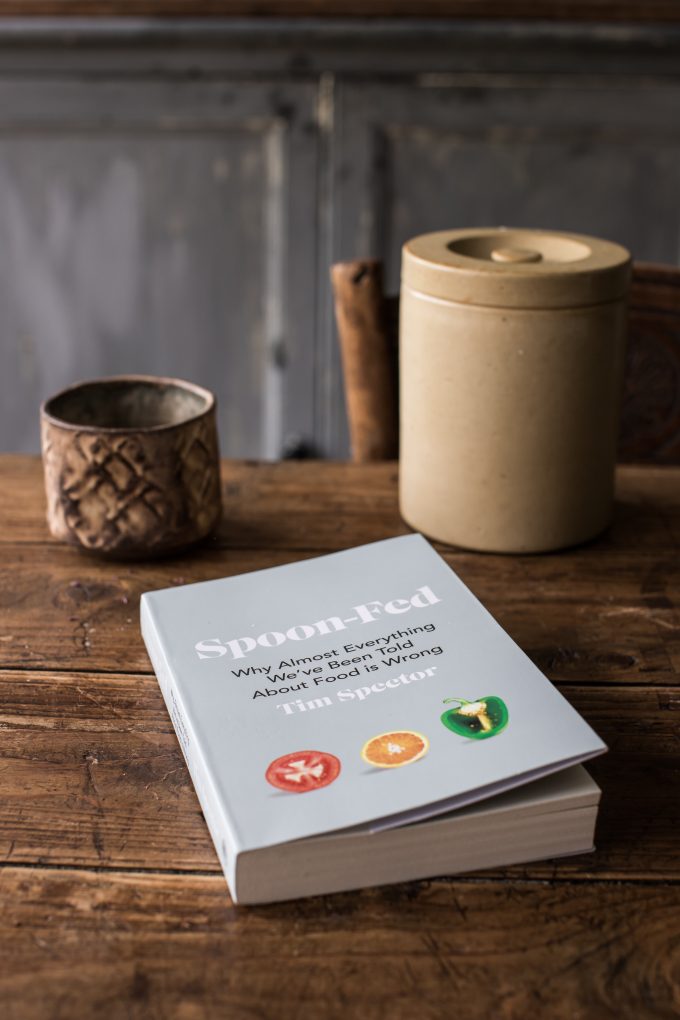
I have known Tim Spector since 2016 when he tested my gut microbes. Tim was also kind enough to write the foreword to my new book The Sourdough School Sweet Baking.
Did you catch this incredible webinar this evening? Tim and the team at ZOE shared the results of their recent PREDICT 1 study, which has been published today: Microbiome connections with host metabolism and habitual diet from 1,098 deeply phenotyped individuals. This research has identified “good” and “bad” microbes in the gut and related them directly to diet and health. This is an unprecedented study; the largest of its kind and it is ongoing – if you are in the US, you can do an at-home test and follow their programme on an app for personalised advice. In the UK, it is hoped this will be available later this year. Through cutting-edge technology, including metagenome sequencing, the team have begun to disentangle the relationships between the gut microbiome, food and health, and shown how one person can respond to a particular food very differently to another. I would say this is particularly relevant when studying gluten.
Here is an extract from Tim’s amazing recent book Spoon-Fed: Why Almost Everything We’ve Been Told About Food Is Wrong.
The Gluten-Free Fad
Myth: Gluten is dangerous
Over the past decade, gluten has acquired a bad reputation. Everyone, regardless of expertise, seems to have an opinion, with celebrities, doctors and nutritionists labelling gluten as unhealthy, unnecessary and potentially dangerous. The wealth of misinformation circulating about gluten and the dearth of good advice on nutrition from professionals has led to the rise in popularity of gluten-free and low-gluten diets. The food industry sees this as a lucrative new market, one currently worth at least $17 billion globally and growing at about 10 per cent a year. With enormous profits at stake, the power of money subtly shapes and influences the debate.
Many of the grains that are typical in most of the world’s diets (wheat, rye, barley and oats) contain a protein called gluten. Gluten, which means glue in Latin, is a mix of two smaller storage proteins, gliadin (which gives dough its plasticity) and glutenin (which makes it elastic). Gluten is formed when water is mixed with flour, and it gives dough its characteristic texture, elasticity and shape. These properties can be altered by fermentation, salt, or changing acidity or moisture.
Without a doubt, gluten is a baker’s friend, and it is one of the most consumed proteins in the world. It’s everywhere. In bread, pasta, pastries, biscuits as well as less obvious sources such as beer, soy sauce and gravy. But for a very small minority (less than 1 per cent) of the population, there is no choice but to avoid all sources of gluten due to a medical diagnosis of coeliac disease or, even more rarely, a wheat allergy. Coeliac disease is a proven allergy to gluten; it is an autoimmune disease where your own immune system attacks your tissues when you eat gluten. Even the smallest morsel of gluten can cause a sufferer to experience a catalogue of debilitating and unpleasant symptoms, including severe diarrhoea, vomiting, severe weight loss, fatigue and anaemia.
Despite the current popularity of gluten-free diets (GF), there is no good evidence that avoiding wheat is good for you. Contrary to popular belief, a recent large follow-up study found that long-term dietary intake of gluten is not associated with increased risk of heart disease; conversely, the study found that restriction of gluten led to suboptimal dietary intake of heart-healthy wholegrains, which could increase the risk of heart disease.1 This study of 100,000 US health professionals, conducted over twenty-six years, found that those with the lowest gluten intakes had a 15 per cent higher chance of having a heart attack. Although observational and so potentially biased, it seems that the extra stress of being on a ‘healthy’ gluten-free diet may not be good for your heart health after all. Approximately one in ten Brits now say they follow a gluten-free diet, and these figures are even higher in the US, despite less than one in a hundred carrying a medically confirmed diagnosis of coeliac disease. Surveys also show that although most people have heard of gluten-free diets, only 20–50 per cent of people have a clear idea what gluten actually is. Many of these are attempting to follow gluten-free diets, despite lacking this crucial piece of information.
To complicate matters further, people with symptoms triggered by gluten who do not meet the diagnostic criteria for coeliac disease may have a controversial condition – Non-Coeliac Gluten Sensitivity (NCGS), a newly established disorder that still lacks a clear clinical definition or diagnostic diet for six weeks to see if your symptoms disappear and then, crucially, reintroduce gluten into your diet to test whether it is really the culprit. Be warned, though, your chances of being right about gluten are slim. An Italian study in 2015 followed 392 self-reported sufferers of gluten intolerance for two years, asking them to cut out gluten, and then re-introduce it into their diets: 6 per cent had some evidence of coeliac disease; 7 per cent met the criteria for non-coeliac gluten sensitivity; and only one in two hundred had a rare wheat allergy. This left over eight out of ten people who, despite complaining of symptoms after consuming gluten and labelling themselves as gluten intolerant, suffered no obvious adverse effects from the consumption of gluten or wheat. So while gluten sensitivity probably exists in some form, it’s far rarer than we’re led to believe.
 Others may feel better on a gluten-free diet because by avoiding gluten, they also eliminate other troublesome foods from their diet, such as beer, wheat and rye… If, after ruling out coeliac disease, you suffer digestive problems and still suspect gluten, you may wish to try a gluten-free cause digestive problems in people with IBS. Some people benefit from gluten-free diets as they have to think more carefully about what they are eating, and thus choose healthier foods and avoid random snacking. The benefits will depend on how good or bad your regular starting diet was. This is a similar phenomenon to what many people experience when they try going vegetarian or vegan for the first time. Generally speaking, if you believe a food will make you feel ill or better, the chances are it will, at least in the short term. As people rely more and more on the advice of so-called experts on social media, their diets are becoming increasingly restricted as various different food groups are deemed dangerous or unhealthy based on limited scientific evidence.
Others may feel better on a gluten-free diet because by avoiding gluten, they also eliminate other troublesome foods from their diet, such as beer, wheat and rye… If, after ruling out coeliac disease, you suffer digestive problems and still suspect gluten, you may wish to try a gluten-free cause digestive problems in people with IBS. Some people benefit from gluten-free diets as they have to think more carefully about what they are eating, and thus choose healthier foods and avoid random snacking. The benefits will depend on how good or bad your regular starting diet was. This is a similar phenomenon to what many people experience when they try going vegetarian or vegan for the first time. Generally speaking, if you believe a food will make you feel ill or better, the chances are it will, at least in the short term. As people rely more and more on the advice of so-called experts on social media, their diets are becoming increasingly restricted as various different food groups are deemed dangerous or unhealthy based on limited scientific evidence.
While a gluten-free diet may help alleviate symptoms in some people, for others it can lead to nutritional problems. Gluten-free products are typically lacking in vitamin B12, folate, zinc, magnesium, selenium and calcium. Other studies found that gluten-free diets in Spain contained on average more fat and less fibre than comparable diets. It is clear that excluding an entire food group from your diet can reduce fibre and dietary diversity, which also affects our gut microbes, creating the possibility of long-term adverse effects.
The large-scale studies suggest that, if anything, eating grains is associated with a lower risk of health problems and obesity. If you need further convincing that it is safe for 99 per cent of us to eat wholegrains, a recent randomised trial in sixty Danish adults for eight weeks found that a diet rich in wholegrains containing gluten reduced both body weight and blood markers of stress (inflammation) in comparison to those on a diet of refined grains.7 If you experiment and change your diet, be aware that any benefits experienced are unlikely to be due to the gluten itself. Unless you have a medically confirmed diagnosis of coeliac disease or a rare wheat allergy, avoiding gluten is likely ‘on average’ to do you more harm than good.
An extract from ‘Spoon-Fed’ by Professor Tim Spector




 We Built a School from the ground up
We Built a School from the ground up
As someone who cut out all grains and legumes about 7 years ago and went onto a Paleo type diet, I can attest to a sensitivity to wheat. Having tried reintroducing it many times, each time I had issues: bloating, stomach cramps, and zits (acne) on the face. I suspect though that the quality of grain could be an issue, and have heard of many Americans doing fine with French/Italian bread while on holiday, but not their own variety back home. Something real must be going on, because there is no way people would give up bread, cakes, pasta, pastries, noodles etc. without any good reason!
I also suspect contributing factors like stress, sedentary lifestyle and generally overeating/grazing. Absent these factors, whole grains might be totally fine. Taken as a whole, it could be too much for the gut micro biome.
HI Chris thank you for your comments. How do you get on with long slow fermented grains? Ie. sourdough?
Personally, I find it very hard to believe that something like wheat, which has been the basis of civilization for over a thousand years ago, can have as many side effects as some preach. However, I would like to consume freshly ground whole wheat flour without bleaches or other industrial chemicals. And, of course I love the sourdough, especially mine that is already like 5 years old.
Best regards